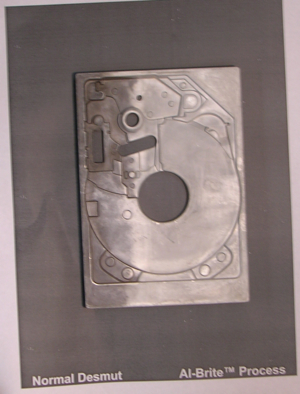Tuesday
Jan262010
Cleaning Up Stainless Steel Parts
ChemPolish™ DD For Particulate Removal from 300 Series Stainless Steel
ChemPolish™ was initially developed more than 20 years ago as a final polish for stainless steel sputtering chambers for the semiconductor industry. It has more recently been found to work extremely well at removing particulate from stainless steel used in the disc drive industry.The particulate count on parts treated in the ChemPolish™ process are significantly lower than parts that have been either simply cleaned, or cleaned and passivated in Nitric Acid. ChemPolish™ has been shown to remove particulate matter normally exposed by cleaning or passivating because ChemPolish™ specifically attacks and removes protuberant particulates. ChemPolish™ removes particulates especially those with jagged or pointed surfaces from the stainless steel leaving behind a smooth shinny surface free of matter which could interfere with the mechanical operation of disk drives.
The ChemPolish™ process is very rapid, when compared to current cleaning methodology and usually requires only a ten minute clean cycle followed by a one minute immersion for final polish, thus allowing much shorter/smaller process lines.
The ChemPolish™ process leaves a brilliant finish, which can approach mirror-like qualities. This finish appearance can be easily utilized to determine if a part has passed through the ChemPolish™ process.
ChemPolish™ Process Line
Process Line |
Concentration & Temperature |
Time |
Heater Equipment |
Process Equipment |
Exhaust Required |
|---|---|---|---|---|---|
60-90 grams/liter 150°-180° F (65°-80° C) |
5+ Minutes |
SS - OK |
SS - OK PVC - NO PolyPro - OK |
No |
|
2. Rinse, tap water, cascade preferred, can usuallly be sent to drain with only pH adjustment.
| |||||
100% by volume 175° ± 5° F (80° ± 2° C) |
1-3 Minutes |
Teflon - NO Titanium - OK SS - NO Quartz - OK |
PVC – NO PolyEth - NO PolyPro - OK SS - NO |
Yes |
|
4. Rinse, deionized water, cascade. (May need to be treated for Nickel & Chromium removal)
| |||||
5. Dry.
| |||||

 Share
Share 